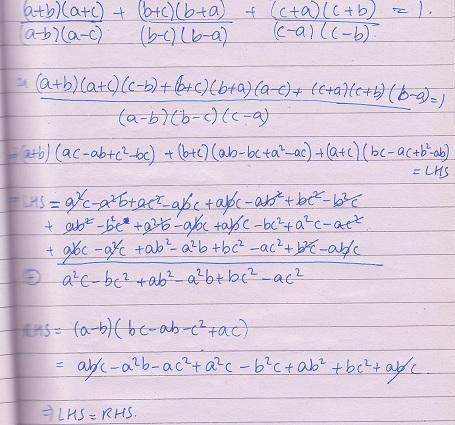unelegant proof :)
This will be torn apart, still it should help us recall some useful facts:
Prove that:
\sum_{cyc} \frac{(a+b)(a+c)}{(a-b)(a-c)} = 1
-
UP 0 DOWN 0 2 13

13 Answers
what helpful fact does this make us recall.........it is damn simple
yes i was indeed
but i studied about this in 10th as an identity
so what is the need to prove an identity
Arshad.. then most of what is discussed is either already known as a fact or proved earlier :P
sorry sir........
but i was just trying to say that we never prove that
(a+b)^2=a^2+b^2+2ab
we just take it as an identity...do we not...though we know that we can prove it any time we want.....
sorry once again if u think my attitude is wrong....
my advice would be: as long as you are aspiring for jee never underestimate any problem that comes your way nor any solution that you see. If you do, you are missing a chance or learn/recall something.
What I had in mind was:
We know the identitty:
\frac{(x-b)(x-c)}{(a-b)(a-c)} + \frac{(x-c)(x-a)}{(b-c)(b-a )}+\frac{(x-a)(x-b)}{(c-a)(c-b )} = 1
Now substitute x=a+b+c
This leads to a number of identities by putting x = 0, 1 or a+b etc. What will remind us of the parent identity ( which is what happened with me when I saw the problem) is the denominator.
Hope this is helpful
oh sorry sir.......i see that u are right...
will try to be less careless in the future